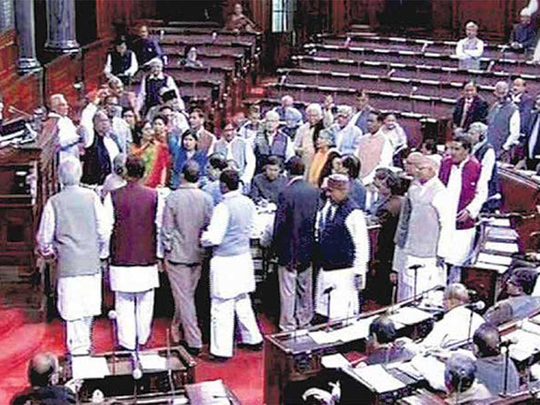
New Delhi: An increasing outpouring of hate speeches and intolerant actions in India over the past few weeks have rekindled fresh concerns for religious minorities in the country under a new party at the helm.
Indian Prime Minister Narendra Modi came under growing pressure last week to sack a minister over a tirade she made against religious minorities, as his outraged opponents disrupted parliament for several days.
Niranjan Jyoti, the junior minister for food processing industries, asked at an election rally recently whether India should be governed by “the children of [Hindu deity] Ram or the children of illegitimates.” The comment was believed to have been an attack on the legitimacy of India’s Muslim and Christian minorities.
And on Friday, the ruling Bharatiya Janata Party (BJP) lawmaker Sakshi Maharaj was forced by a united opposition to express regret in the lower house of Parliament for describing Mahatma Gandhi’s assassin Nathuram Godse as a “patriot,” a comment condemned by the Modi government too.
Even as chaotic scenes continued in Parliament throughout last week, Modi’s Hindu nationalist BJP has been accused of exploiting religious divisions in the run up to general elections six months ago, a tactic that opponents say helped the party win the largest election victory in 30 years in May.
In particular, Modi’s rise to power coincides with an increasingly hostile climate for Christians and Muslims in some parts of India, with seven states now having anti-conversion laws in place.
The new laws, for instance, have curtailed church activities even in states that do not have them, with pastors increasingly being accused of “forcible conversion”. The All India Christian Council feels the rhetoric from the government so far has “provided little reassurance that security and freedom for Christians and other minorities would be high on the list of priorities for the new administration”.
With reference to Niranjan Jyoti’s comments, Congress party spokesman and Rajya Sabha member Abhishek Singhvi wondered why such efforts to create communal tension happened with “monotonous regularity” before every election.
“To simply walk into Parliament and withdraw a statement does not erase culpability. Whenever there is an assault on the idea of India, Modi is silent. What message is he sending with his silence? That the police can look the other way,” Singhvi told Gulf News.
Another row erupted last week over the alleged conversion of 300 Muslims in Agra by an offshoot of the Rashtriya Swayamsevak Sangh (RSS), the BJP’s ideological mentor.
A cell of the RSS and its affiliate Bajrang Dal claimed they reconverted the 300 people to Hinduism at a mass conversion ceremony last week. The two organisations have been accused of luring people with the promise of monetary benefits.
Most of the converts were reportedly slum dwellers from the state of West Bengal, and a woman who had attended the ceremony told Gulf News they had no idea they would be converted.
“We were forced to convert. We were promised our identification and ration cards will be made at the camp,” she said on condition of anonymity.
The conversion row was the latest in the series of controversies the federal government is battling.
Azam Khan, a senior leaderfrom Uttar Pradesh’s ruling Samjawadi Party, accused the BJP of vitiating the communal harmony in the country. “The Muslims were lured into reconversion. Forcible conversions violate the Indian Constitution and the government should take this into serious consideration,” he told Gulf News.
While incidents of violence against minorities have occurred across India, the most recent is a fire two weeks ago at St Sebastian’s Church in Delhi, which gutted its entire interior. While opposition lawmakers in the Parliament claimed the fire was “planned” with “an intention to make it a communal issue,” the government assured that the incident will be investigated. Interestingly, elections are expected in Delhi early next year.
The president of the National Congress of Indian Christians, CA Daniel, predicts that this trend will only grow with the BJP leading the country.
“The country is becoming communally sensitive and minorities are at a greater risk than ever before. Sikhs, Jains and Buddhists are closer to Hindus in theology and philosophy, perhaps that explains why we are doing better than Muslims and Christians in India,” Sikh leader Avaninder Singh, who also runs an NGO for the welfare of Sikh women, told Gulf News by phone.
Analysing the mindset behind the culture of intolerance, historian Ravi Kant Sharma told Gulf News: “Violence against minorities has been seen by human rights outfits as a tactic used to meet political ends. The roots of this violence lie in India’s history, stemming from resentment toward the Islamic domination of India during the Middle Ages, policies established by the country’s British colonisers and the violent partition of India into a Muslim Pakistan and a secular India with a large minority of Muslims, Christians and Sikhs.”
The spate of incidents has only served to increase the pressure on Modi, whose appeal for forgiveness on Jyoti’s comments was rejected by opposition parties last week. “Narendra Nodi is pretending to be a changed person, but the fact is he is bluffing. The country has not forgotten his comments referring to Indian Muslims as a puppy while talking about the Gujarat riots,” Majlis-e-Ittihad Al Muslimin (MIM) leader Akbaruddin Owaisi said.
However, federal minister Venkaiah Naidu said allegations of a rise in communal violence were baseless. “The Congress party and communalism go hand in hand. It is the Congress’ communal agenda which has brought the country to this state,” he said.
With inputs from Reuters












